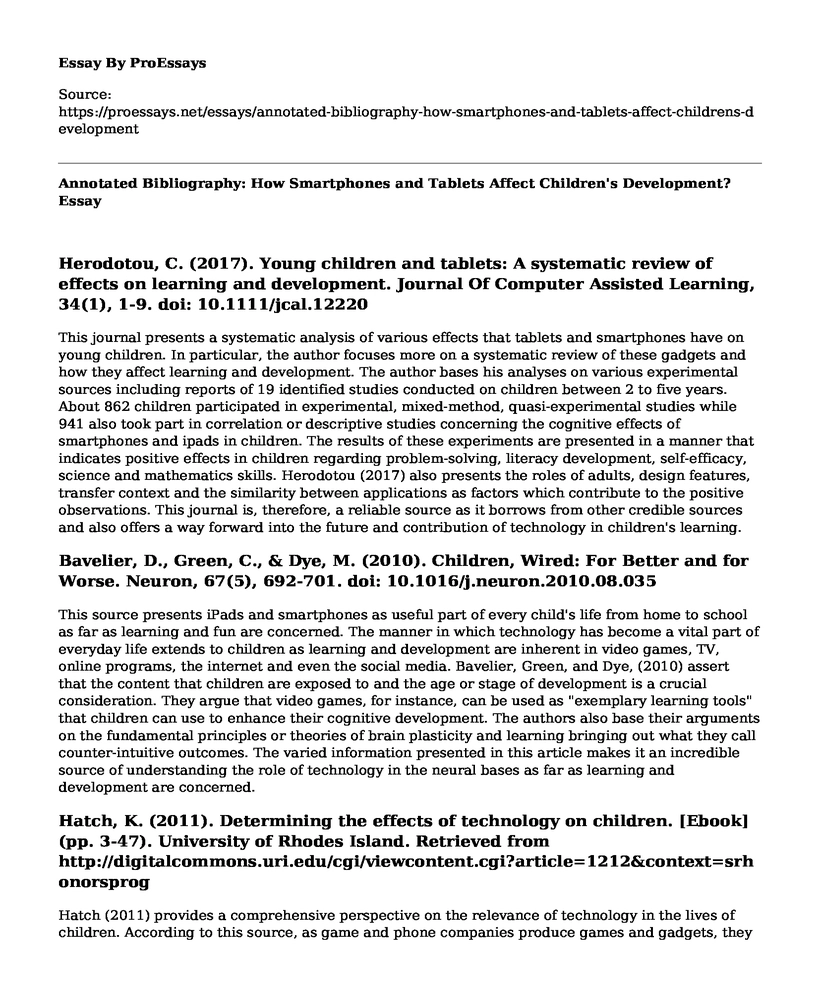Herodotou, C. (2017). Young children and tablets: A systematic review of effects on learning and development. Journal Of Computer Assisted Learning, 34(1), 1-9. doi: 10.1111/jcal.12220
This journal presents a systematic analysis of various effects that tablets and smartphones have on young children. In particular, the author focuses more on a systematic review of these gadgets and how they affect learning and development. The author bases his analyses on various experimental sources including reports of 19 identified studies conducted on children between 2 to five years. About 862 children participated in experimental, mixed-method, quasi-experimental studies while 941 also took part in correlation or descriptive studies concerning the cognitive effects of smartphones and ipads in children. The results of these experiments are presented in a manner that indicates positive effects in children regarding problem-solving, literacy development, self-efficacy, science and mathematics skills. Herodotou (2017) also presents the roles of adults, design features, transfer context and the similarity between applications as factors which contribute to the positive observations. This journal is, therefore, a reliable source as it borrows from other credible sources and also offers a way forward into the future and contribution of technology in children's learning.
Bavelier, D., Green, C., & Dye, M. (2010). Children, Wired: For Better and for Worse. Neuron, 67(5), 692-701. doi: 10.1016/j.neuron.2010.08.035
This source presents iPads and smartphones as useful part of every child's life from home to school as far as learning and fun are concerned. The manner in which technology has become a vital part of everyday life extends to children as learning and development are inherent in video games, TV, online programs, the internet and even the social media. Bavelier, Green, and Dye, (2010) assert that the content that children are exposed to and the age or stage of development is a crucial consideration. They argue that video games, for instance, can be used as "exemplary learning tools" that children can use to enhance their cognitive development. The authors also base their arguments on the fundamental principles or theories of brain plasticity and learning bringing out what they call counter-intuitive outcomes. The varied information presented in this article makes it an incredible source of understanding the role of technology in the neural bases as far as learning and development are concerned.
Hatch, K. (2011). Determining the effects of technology on children. [Ebook] (pp. 3-47). University of Rhodes Island. Retrieved from http://digitalcommons.uri.edu/cgi/viewcontent.cgi?article=1212&context=srhonorsprog
Hatch (2011) provides a comprehensive perspective on the relevance of technology in the lives of children. According to this source, as game and phone companies produce games and gadgets, they target not only the adults but also the children especially teenagers who have access to smartphones and iPads. Through her extensive research, Hatch (2011) presents results indicating that technology and electronic gadgets are indeed helpful in the "mental and physical development" development processes of teenagers. The credibility of this source is inherent in the results of various and diversified surveys, expert interviews, and interaction with children of different ages. The objectivity of this source is shown through the adverse effects of technology but importantly, the ways through which the usage of smartphones and iPads can be incorporated in the children's lives to aid their development further.
Walters, J. (2015). Tablets and smartphones may affect social and emotional development, scientists speculate. Retrieved from https://www.theguardian.com/technology/2015/feb/01/toddler-brains-research-smartphones-damage-social-development
Like many other authors trying to find the effects of smartphones and tablets on the developmental processes of children, Walters (2015) delves into an extensive collection of research material touching on the issue. According to this journal, specific practices like taking a child's attention by giving them a smartphone or tablet can interfere with their "internal mechanisms of self-regulation". The journal goes lengths to justify through other research works, that smartphones and tablets are capable of negatively affecting children's social and emotional development. Borrowing from the findings of researchers from the University of Boston, the author also indicates that children's interaction with the gadgets' interactive screen interferes with their problem-solving skills in math and science, especially if the children below three years of age. These perspectives make this a reliable and credible source for investigating the effects of these gadgets on the development and growth of children.
Reference List
Bavelier, D., Green, C., & Dye, M. (2010). Children, Wired: For Better and for Worse. Neuron, 67(5), 692-701. doi: 10.1016/j.neuron.2010.08.035
Hatch, K. (2011). Determining the effects of technology on children. [Ebook] (pp. 3-47). University of Rhodes Island. Retrieved from http://digitalcommons.uri.edu/cgi/viewcontent.cgi?article=1212&context=srhonorsprog
Herodotou, C. (2017). Young children and tablets: A systematic review of effects on learning and development. Journal Of Computer Assisted Learning, 34(1), 1-9. doi: 10.1111/jcal.12220
Walters, J. (2015). Tablets and smartphones may affect social and emotional development, scientists speculate. Retrieved from https://www.theguardian.com/technology/2015/feb/01/toddler-brains-research-smartphones-damage-social-development
Cite this page
Annotated Bibliography: How Smartphones and Tablets Affect Children's Development?. (2022, Jun 19). Retrieved from https://proessays.net/essays/annotated-bibliography-how-smartphones-and-tablets-affect-childrens-development
If you are the original author of this essay and no longer wish to have it published on the ProEssays website, please click below to request its removal:
- Should Adderall Be Used as a Performance Enhancing Drug for College Students?
- Primary and Secondary Goals of the United States Energy Policy Essay
- Influence of Physical Activity on Cognitive Development and Functioning in Children - Paper Example
- Article Analysis Essay on 'Risky' Playgrounds Are Making a Comeback
- Paper Example on Literacy Journey: Evolving with Time & Culture
- Essay Sample on Gamification: Enhancing Learning with Fun and Excitement
- Essay Sample on Right to Religious Freedom vs Duty to Protect Children







